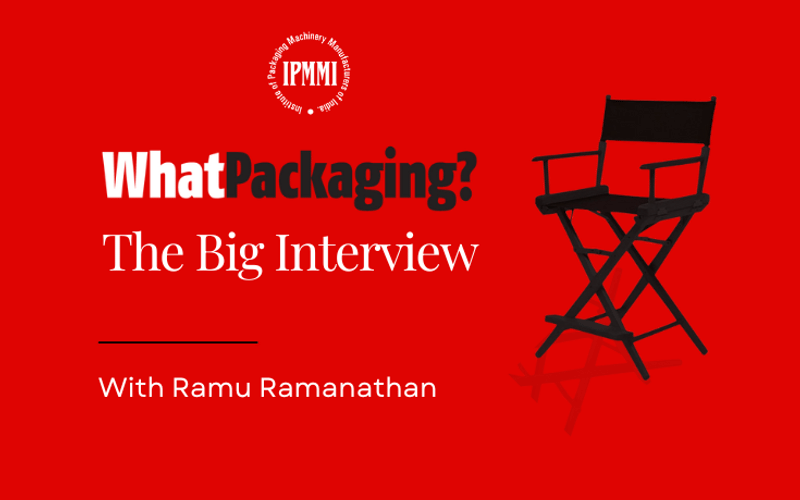The Big Interview aims to demystify packaging and showcase its potential
The WhatPackaging? podcast series in collaboration with The Institute of Packaging Machinery Manufacturers of India (IPMMI) features insights from industry leaders like Aarem Engineering, Nilkamal and Stelda.
04 Feb 2025 | By Sai Deepthi P
Packaging is often called the silent salesman. According to a market report, the B2B packaging market in India was valued at USD 50.5-billion in 2019 and is anticipated to grow to USD 204.81-billion by 2025, with a CAGR of 26.7% from 2020 to 2025, showcasing its huge potential. The Big Interview series offers viewers a well-rounded understanding of this growing industry—practical insights, case studies, packaging applications across various sectors, and future projects. It aims to bridge the gap between products and customer experiences.
In the first instalment of the series, Rupesh Shah, founder of Aarem Engineering, discussed what's driving a leap in productivity, boosting output at Aarem as the company goes on to record an impressive year-on-year growth. The company is transitioning from semi-automatic to fully automatic shrink wrapping and stretch wrapping machines. Shah said, "There was a trend about 10-12 years back where people were working with lower economics, so they wanted semi-automatic machines, now that has changed. Over the last period of five-six years, unit economics have become a volume game, so now they need to pack volume up, with automatic machines to suit their requirements. We have a complete in-house designing department to make those machines."
In the second instalment, Prasad Kulkarni, general manager of commercial industrial at Nilkamal, highlighted the growth of the coding and marking equipment market. He emphasised the significance of Continuous Inkjet (CIJ) technology, upcoming product launches, and investments in quality standards. He noted evolving customer expectations, service standards, and regulatory landscapes, underscoring the need for sustainability and regulations across industries. Kulkarni added, "Sustainability is a key factor in whatever we do today. The leaders then didn't look at sustainability, so now we had to have a lot of time focused on sustainability."
In the third conversation, Pallippuram Sajith, director of Stelda, shared insights on the future of packaging—automation, intelligent packaging, and sustainability. He emphasised the importance of adopting customer-centric strategies as Stelda’s plans to integrate its shipping cartons and filling businesses, introduce case packaging solutions, and prioritise reducing single-use plastics. Stelda, as Sajith shared, eliminates the need for plastic tapes, straps, and shrink wraps by providing an alternative glue-sealing solution for shipper cartons. These changes help businesses reduce operational costs, pilferage, and damage losses by over 30%.
In the fourth conversation of The Big Interview series, Milind Bhalerao, managing director, Becker India, spoke in great detail about Becker's investments, ever-expanding portfolio, the company's offerings for the packaging industry, the company's blueprint for 2025, and their six-month-old R&D training centre in India. Becker India aims to hit a 25% growth rate this year. Bhalerao states, "The focus in 2025 is investments and expanding our capabilities." Regarding the packaging industry trends, he says, "The food processing sector has now become one of the fastest growing industries even for us." While eliminating the consideration for degrowth, he emphasises that the company's only mantra remains: "Growth, growth and only growth."
In the fifth instalment of The Big Interview series, Bipin Panchal, chairman and managing director of Global Pet Industries, joined us from his factory office in Vasai. Known for their leadership in PET stretch blow moulding machines, Global Pet has become a significant name in the packaging machinery space. There was a detailed discussion about the blow moulding industry, where Panchal noted the shift from PVC and HDPE to PET bottles and the evolution of die-making and preform technologies. He made several key announcements and stated that Global Pet Industries is in the process of expanding its infrastructure and will soon be launching a new facility to enhance capacity to improve turnaround times. He also spoke about the company’s plans to introduce a next-gen automatic blow moulding machine, developed entirely in India, with an eye on export markets across Southeast Asia and Africa.
In the sixth instalment of The Big Interview series, Ravi Kiran, business director at Valco Melton, discussed the rising demand for advanced adhesive dispensing and quality inspection systems in India, expected to grow at a 15% CAGR by 2030. In the latest podcast, he shared how they began with a two-member team in 2018 and gradually scaled up to a 50-member team with a manufacturing and assembly facility in Pune. Kiran explained how they localised production to make systems more suitable and affordable for the Indian market, especially for sectors like corrugation, folding cartons and hygiene. He spoke about customer expectations around quality and service and how Valco Melton focuses on solving problems instead of just selling products. Kiran shared insights on Valco Melton’s 50% production expansion, focus on digital transformation, remote machine access, and sustainability. Speaking about what’s in store for Valco Melton, he said there would be more system integration, software, and smart inspection systems that add value beyond just glue dispensing.
In the seventh instalment of The Big Interview series, Samir Limaye, director at Wimco, reflected on the evolution of manufacturing from the company’s early days in Ambernath to the current operations in Bangalore, emphasising the importance of building customer trust and creating long-term value. There's a focus on the precision required for filling processes, with special attention to the shift in SKU sizes driven by changing consumer behaviours, particularly the impact of women in the workforce. Limaye highlighted the importance of automation and camera-based solutions to improve efficiency and reduce rejections. Sustainability also plays a key role, not just in materials but in the longevity and efficiency of machinery.
So far, seven podcasts have been published on WhatPackaging? YouTube channel, while the vision is to create a case study of 25 companies and industry A-listers discussing everything from the evolution of packaging and future trends to regulatory and sustainable considerations.


